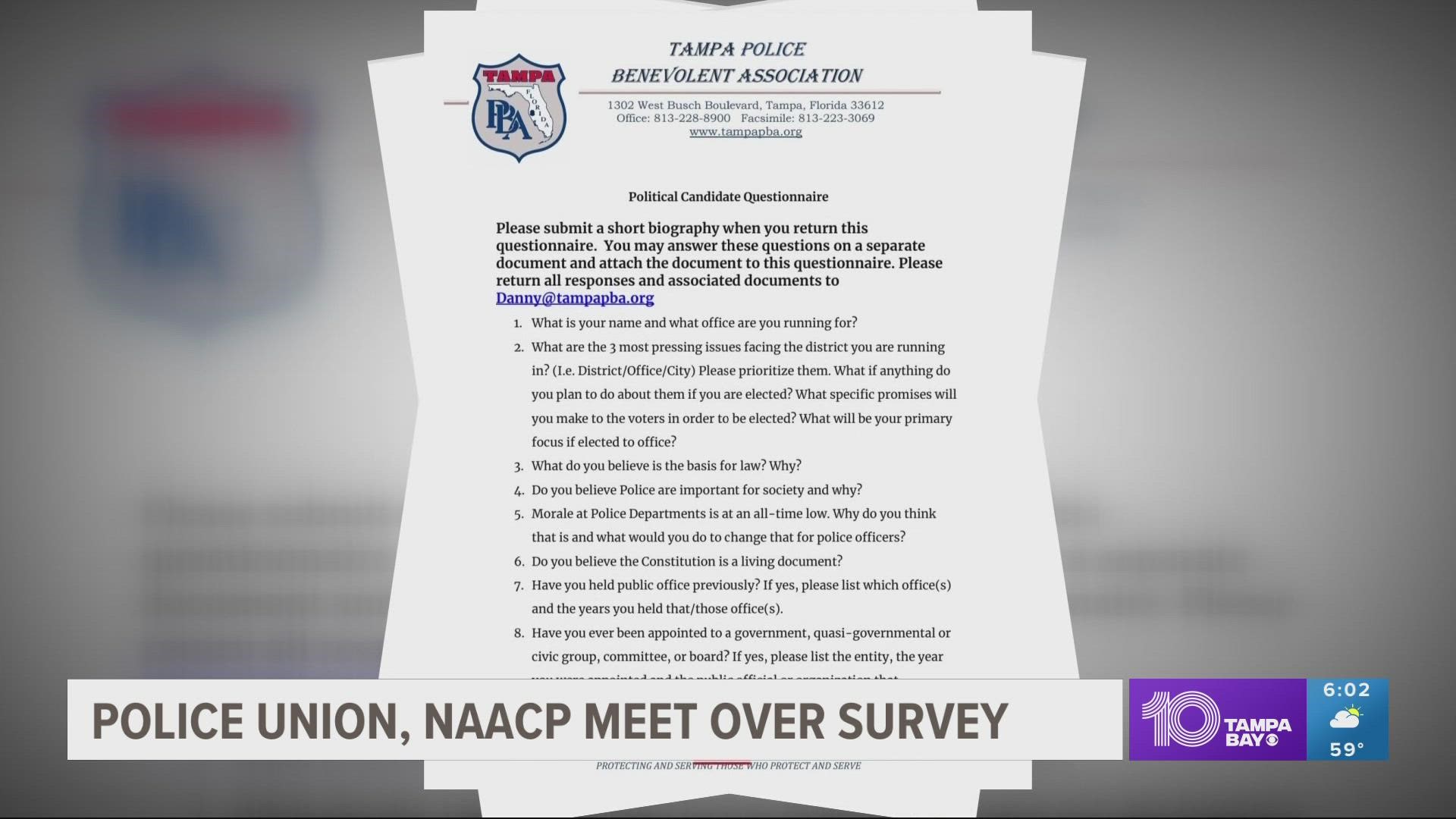TAMPA, Fla. — At a closed-door meeting this week with the Hillsborough County NAACP and members of the Black law enforcement community, leaders of the Tampa Police Benevolent Association heard grievances about the union’s controversial city council endorsement questionnaire that raised concerns of racial bias.
“It was a first step,” said Yvette Lewis, president of the Hillsborough County NAACP.
The 28-question survey asks candidates a few basic questions ranging from offices candidates previously held to their views on the most pressing issues for their district.
But the questionnaire quickly moves into a different line of questioning —asking candidates their thoughts on the Second Amendment, if they’ve ever “published anything that would be considered anti-police or critical of police” online and if they supported Black Lives Matter.
“I think the PBA should own up and accept responsibility that that was bad wording and which I do believe they have. But I think the community, the African-American community, deserves an apology,” Lewis said.
Supporting the NAACP at the meeting was Susan Bowers, a retired TPD officer who served for 22 years. She said it appeared union leaders lacked a historical perspective of the strained relationship between police and Black communities.
She also said there appeared to be a lack of understanding of the Black Lives Matter movement, and a tendency to group anyone who supported the nation’s largest movement for racial justice with left-wing extremists.
"If they understand the history of Black people and policing of the Black community…then I think they would be better equipped to deal with whatever they want to ask,” said Bowers.
The retired TPD officer also said she talked to union leaders about Tampa’s longstanding divide between police and the Black community. She said she shared the story of civil unrest in 1967 after a white officer shot 19-year-old Martin Chambers in the back after an alleged robbery. Chambers did not survive.
Tampa was one of many cities experiencing racial unrest in 1967, and President Lyndon Johnson’s Kerner Commission addressed the fallout in a well-known report.
"It traces a lot of these historical moments of police brutality and then what they termed as riots,” USF professor Travis Bell told 10 Tampa Bay in 2021. "The Kerner Commission report points a finger basically at the United States and says look, this is going on in these racialized communities, and we should do something about it.”
It's this type of historical perspective that Bowers and Lewis say is necessary for law enforcement for effective, community-based policing.
Dr. Randy Nelson, head of the criminal justice graduate program at Bethune-Cookman University, travels the state to help improve relationships between police and the communities they serve.
He said the questionnaire sends the wrong message.
“I think this is almost like a litmus test,” he said.
“When you put something like this out – 'Are you anti-police, do you support Black Lives Matter?' Well, there are good folks that support Black Lives Matter and also support the police,” he said. “Based on this [survey], I'm thinking they're saying if [candidates] support Black Lives Matter, then they don’t support police. That's why things like this are dangerous.”
PBA President Brandon Barclay and PBA attorney/spokesperson Danny Alvarez were both in attendance at this week’s meeting. Barclay would not speak to 10 Investigates after the meeting, but Alvarez said, "It was a good meeting. Yvette was very open and we have a great relationship with her. We talked about and we listened to them and we understand their concerns."
The PBA also sent this statement last week:
"Like other groups, The Tampa Police Benevolent Association uses its questionnaire to help determine the depths and extent of a political candidate's experiences and positions as they relate to police and our membership without regard to party, race, orientation or gender.
"We value candor and honesty in the process and we have even endorsed individuals who differ and disagree with us on issues because they were the right person for the job. To describe our intentions in any other light is not only dishonest, but shameful and indicative of the discourse many politicians in our area want to continue in order to distract from their own personal and professional shortcomings."
Lewis said the PBA has not committed to a public apology, but there have been talks of removing controversial parts of the questionnaire.
“It doesn't get to the root, but what it does, it helps heal some of the wounds that they reopened. But getting to the root of the problem is actually knowing your history,” said Lewis. “I think it's time for Tampa Police Department to understand the history of African-American people…”
She also discourages candidates from completing the survey.
“Candidates, If you receive that ballot, stamp it 'return to sender,’” she said.
Emerald Morrow is an investigative reporter with 10 Tampa Bay. Like her on Facebook and follow her on Twitter. You can also email her at emorrow@10tampabay.com.
10 Tampa Bay anchor/reporter Miranda Parnell contributed to this report.

